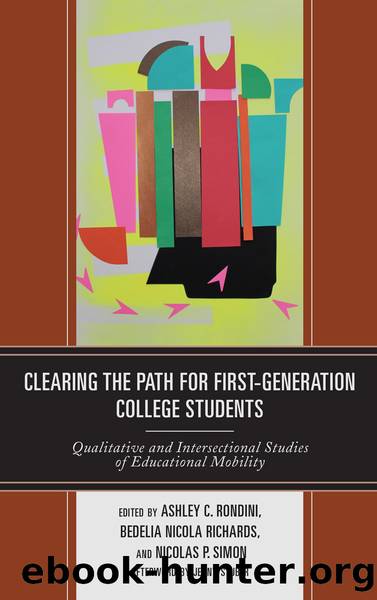Clearing the Path for First-Generation College Students by unknow

Author:unknow
Language: eng
Format: epub
ISBN: 9781498537025
Publisher: Lexington Books/Fortress Academic
Parent Influences on Education through Advocating and Intervening in School
Unlike the direct support that parents provide in their childrenâs educational lives, the intergenerational and transnational process that privileges undocumented students with college-educated parents over their first-generation peers operates in less direct and sometimes unexpected ways. The educational trajectory of immigrant students is shaped by the educational systems and opportunities for these students in their home country as well as those they are met with upon arriving in the United States, reflecting social, political, and economic differences between sending countries as well as differences in wealth among immigrant families (Portes and Rumbaut 2001, Feliciano 2006). Contrary to some common expectations about the quality of education in developing nations compared to the United States, three interviewees described private schools that they attended in their home country, and the shock of transitioning to an urban school system in the United States. This observation about the experience of private education does not imply that all immigrants experienced higher educational quality in their home country than in the United States; rather, it is meant to challenge sometimes mistaken assumptions about the superiority of US education and is consistent with segmented assimilation theory, which recognizes that many new immigrant children are channeled into low-income public schools (Portes and Zhou 1993). For example, Alejandra, one of the students with college-educated parents, described her shock when she encountered the behavior of classmates in Boston Public Schools:
I was sheltered in Colombia. Yâknow, Colombia is very violent, yeah, you hear all about this, but I was very sheltered in a way, so I didnât hear it. But my experiences in [US] public school, I toughened up. I guess thatâs the word like, I toughened up. I learned about that kids would do drugs. I learned that kids who donât go to school, they could drop out at 16. I never thought that. . . . And oh!âwhat shocked me the most was like, when kids would yell at the teachers. Like, in Colombia you donât do that. You respect your teachers. Youâre supposed to respect your elders. Yâknow, but you donât hear them yelling, be like âbitch! Youâre such a bitch.â I never heard that in Colombia until I came here. I never thought that kids my age would be yelling at their professors, saying like âbitch!â Or âyouâre such an asshole.â Yâknow, all those bad words. That was really a shock, a cultural shock for me because kids were like very âout there.â I donât know what kind of âout thereâ but they were out there. I went to [a competitive public school] because my experience was like, too much for me, I couldnât take it.
TPS: That was here in Boston?
Alejandra: Yeah, in [another neighborhood]. So, then I went there, but I was in shock, because I thought that [my neighborhood public school] was tough⦠but that was so much tougher than [the public school]. Like they had no mirrors inside the bathrooms. Because they knew that they would fight, the girls, and yâknow they would hurt them with the mirrors.
Download
This site does not store any files on its server. We only index and link to content provided by other sites. Please contact the content providers to delete copyright contents if any and email us, we'll remove relevant links or contents immediately.
Cecilia; Or, Memoirs of an Heiress — Volume 1 by Fanny Burney(32558)
The Great Music City by Andrea Baker(32019)
Cecilia; Or, Memoirs of an Heiress — Volume 2 by Fanny Burney(31956)
Cecilia; Or, Memoirs of an Heiress — Volume 3 by Fanny Burney(31942)
We're Going to Need More Wine by Gabrielle Union(19046)
All the Missing Girls by Megan Miranda(16028)
Pimp by Iceberg Slim(14508)
For the Love of Europe by Rick Steves(14121)
Bombshells: Glamour Girls of a Lifetime by Sullivan Steve(14075)
Talking to Strangers by Malcolm Gladwell(13370)
Norse Mythology by Gaiman Neil(13365)
Fifty Shades Freed by E L James(13241)
Mindhunter: Inside the FBI's Elite Serial Crime Unit by John E. Douglas & Mark Olshaker(9343)
Crazy Rich Asians by Kevin Kwan(9292)
The Lost Art of Listening by Michael P. Nichols(7506)
Enlightenment Now: The Case for Reason, Science, Humanism, and Progress by Steven Pinker(7313)
The Four Agreements by Don Miguel Ruiz(6765)
Bad Blood by John Carreyrou(6621)
Weapons of Math Destruction by Cathy O'Neil(6280)
